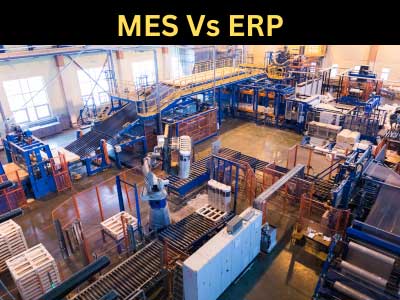What Are ERP And MES Systems?
Key Takeaway
ERP (Enterprise Resource Planning) and MES (Manufacturing Execution System) are both essential for modern manufacturing operations but serve different purposes. ERP systems automate core business processes and provide real-time visibility into operational and financial performance. They help manage functions like accounting, human resources, procurement, and inventory management.
MES, on the other hand, focuses specifically on the manufacturing process. It manages and monitors production on the factory floor, ensuring efficient operations, quality control, and real-time data collection. MES provides detailed insights into work-in-progress, scheduling, and performance tracking.
In summary, ERP handles broader business management, while MES focuses on optimizing manufacturing processes. Together, they streamline operations and enhance productivity.
Definition of ERP
ERP stands for Enterprise Resource Planning. It is an integrated management system used by organizations to collect, store, manage, and interpret data from various business activities. ERP systems streamline processes across departments, covering functions like finance, HR, procurement, inventory management, and customer relationship management.
By integrating these functions, ERP systems improve data accuracy, facilitate information flow, and support decision-making. Major providers like SAP, Oracle, and Microsoft offer comprehensive ERP solutions used widely in various industries. A key benefit of ERP systems is their ability to provide a unified view of the business, enhancing coordination and collaboration among departments. This holistic approach helps organizations optimize resource utilization, reduce operational costs, and improve overall efficiency.

Definition of MES
MES stands for Manufacturing Execution System. It is a software solution designed to manage and monitor manufacturing processes on the shop floor. MES systems track production activities in real-time, providing detailed insights into every aspect of the manufacturing process.
MES systems cover areas such as production scheduling, quality control, labor management, and equipment maintenance. They collect data from machines and operators, offering a granular view of the manufacturing operations. This data helps identify bottlenecks, improve production efficiency, and ensure product quality.
Key features of MES systems include real-time monitoring, work order management, traceability, and compliance reporting. Companies like Siemens, Rockwell Automation, and Honeywell provide robust MES solutions tailored to various manufacturing environments. By implementing MES, manufacturers can achieve higher levels of efficiency, reduce downtime, and enhance product quality.
You May Like to Read
Key Differences
While ERP and MES systems both aim to improve organizational efficiency, they serve different purposes and operate at different levels:
Scope: ERP systems cover enterprise-wide functions, integrating various business processes into a single system. MES, on the other hand, focuses specifically on the manufacturing process, providing detailed insights into shop floor operations.
Data Flow: ERP systems manage the flow of information across different departments, ensuring data consistency and accuracy. MES systems collect real-time data from manufacturing operations, providing a detailed view of production activities.
Functionality: ERP systems include modules for finance, HR, procurement, and more, supporting strategic decision-making. MES systems focus on production scheduling, quality control, and equipment maintenance, enhancing operational efficiency.
Integration: ERP systems integrate with various business functions, offering a holistic view of the organization. MES systems integrate with shop floor equipment and processes, providing real-time visibility into manufacturing operations.
Understanding these differences helps organizations choose the right system for their needs and ensures seamless integration between ERP and MES.
How They Work Together
ERP and MES systems complement each other, creating a cohesive environment for managing both enterprise-level and shop floor activities. Here’s how they work together:
Data Synchronization: MES systems collect real-time production data, which is then synchronized with the ERP system. This ensures that the ERP has the latest information on production status, inventory levels, and work orders.
Production Planning: ERP systems generate production plans based on demand forecasts and inventory levels. MES systems use these plans to schedule and manage shop floor activities, ensuring that production aligns with overall business objectives.
Quality Management: MES systems monitor production quality in real-time, identifying defects and ensuring compliance with standards. This quality data is shared with the ERP system, helping improve overall product quality and reduce returns.
Resource Allocation: ERP systems manage resources such as raw materials, labor, and equipment. MES systems optimize the use of these resources on the shop floor, improving efficiency and reducing waste.
Performance Reporting: MES systems provide detailed reports on manufacturing performance, which are integrated into the ERP system. This enables comprehensive performance analysis and supports continuous improvement efforts.
By integrating ERP and MES systems, organizations can achieve better visibility, coordination, and control over their operations, leading to improved efficiency and productivity.
Industry Examples
Numerous industries benefit from the integration of ERP and MES systems. Here are a few examples:
Automotive: In the automotive industry, ERP systems manage procurement, inventory, and finance, while MES systems oversee production scheduling, quality control, and equipment maintenance. Integration ensures that production aligns with demand and quality standards.
Pharmaceuticals: Pharmaceutical companies use ERP systems for regulatory compliance, inventory management, and financial reporting. MES systems monitor production processes, ensuring adherence to strict quality standards and traceability requirements.
Food and Beverage: ERP systems handle supply chain management, financials, and customer orders, while MES systems manage production scheduling, quality control, and traceability. Integration helps maintain product quality and regulatory compliance.
Electronics: In the electronics industry, ERP systems manage procurement, inventory, and financials, while MES systems oversee production scheduling, quality control, and equipment maintenance. Integration ensures efficient production and high product quality.
These examples illustrate how the integration of ERP and MES systems enhances efficiency, quality, and compliance across various industries.
Conclusion
In conclusion, ERP and MES systems play crucial roles in modern manufacturing, each serving distinct but complementary purposes. ERP systems provide a broad, enterprise-wide view, integrating various business functions to support strategic decision-making. MES systems focus on the manufacturing process, offering real-time insights and control over shop floor operations.
By understanding the differences and synergies between ERP and MES, organizations can leverage both systems to optimize their operations. Integration of ERP and MES ensures seamless data flow, better coordination, and improved efficiency, ultimately leading to enhanced productivity and competitiveness in the market.
